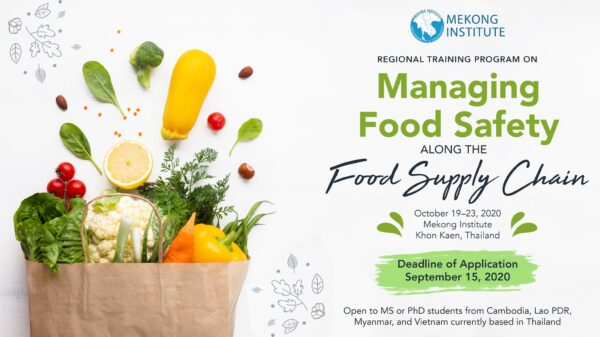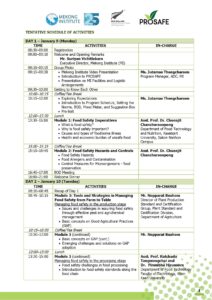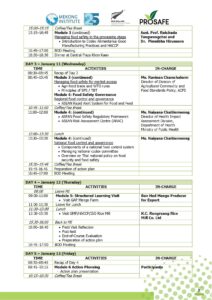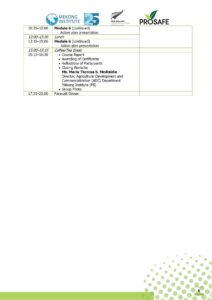Food safety has gradually become a major socioeconomic and political concern in many developing countries. The Food and Agriculture Organization of the United Nations suggests that “food security exists when all people, at all times, have physical and economic access to sufficient, safe, and nutritious food that meets their dietary needs and food preferences for an active and healthy life.” Some experts argue that enabling access to safe food should be a major component in global and local initiatives addressing food security.
Exponential population growth, increasing rates of poverty and hunger, climate change and environmental degradation pose threats to food security. Technological advances in food and non-food production—while providing benefits—can also pose threats to human health and safety. The basic question now is whether the food on our table is safe and of good quality.
Because of growing concerns about food safety, many international organizations and national governments have been devising mechanisms to ensure the safety of food products available in the market. However, low public awareness of food safety renders producers—often small-scale enterprises—as well as consumers complacent in adopting safe food practices. Othman, in his 2014 paper titled Food Safety in Southeast Asia: Challenges Facing the Region, highlighted that “food safety can no longer be the luxury of the rich since all people should have the right to an adequate supply of safe and nutritious food.” With this comes a growing recognition of the importance of raising public awareness on proper food handling across the farm-to-table spectrum.
In line with this, Mekong Institute will organize the Regional Training Program on Managing Food Safety along the Supply Chain from January 9-13, 2023 in Khon Kaen, Thailand. This safe food course targets to bring together government officials, agri-food operators and exporters, and academics from Cambodia, Lao PDR, Myanmar, and Vietnam (CLMV) currently involved in food production, processing and trade to attend a five-day program to be delivered by regional food safety experts. Full training scholarships, which will cover the training fees as well as travel and accommodation expenses, will be provided.
The regional training program is designed to raise the awareness of CLMV food safety stakeholders on emerging safe food issues and concerns by providing a platform for the mutual exchange of ideas, knowledge, and experiences.
Specifically, the course aims to:
- Enhance participants’ understanding of the food safety control roles of stakeholders in the food supply chain;
- Be able to identify food safety hazards and management tools and best practices at different stages in the food supply chain.
- Strengthen understanding of food safety governance and control system
- Increase networking and interaction among participants for collaborative work on food safety.
The training program will cover the following modules:
Module 1: Food Safety Imperatives
This module introduces the participants to the importance of food safety and its impact on SDGs and agri-food trade. The module tackles essential aspects of food safety, health issues, and the impact of unsafe food on the economy and SDGs.
- What is food safety?
- Why is food safety important?
- Causes and types of foodborne illness
- Health and economic burden of unsafe food
Module 2: Food Safety Hazards and Controls
This module focuses on the four most common food safety hazards that may be present in a workplace and the risk they pose to consumers if they get into food. This module also introduces various techniques in controlling cross-contamination and food safety hazards with proper food hygiene practices.
1. Food Safety Hazards
- Physical Hazards and their control
- Chemical Hazards and their control
- Biological Hazards and their control
2. Food Allergens and Contamination
3. Control Measures for Microorganisms – food preservation
Module 3: Tools and Strategies in Managing Food Safety from Farm to Table
Participants will interact with the regional expert to discuss international best practices in managing food safety. Moreover, invited resource speakers will also introduce basic concepts and strategies in managing food safety risks from the production, processing, distribution, and consumption stages.
Managing food safety in the production stage
- Issues and challenges in assuring food safety through effective pest and agrichemical management
- Basic concepts of Good Agricultural Practices
- Emerging challenges and solutions on GAP adoption
Managing food safety in the processing stage
- Food safety challenges in food processing
- Introduction to food safety standards along the food chain
- Introduction to Codex Alimentarius Good Manufacturing Practices and HACCP
Managing food safety for market access
- Agri-food trade and WTO rules
- Principles of SPS / TBT
Module 4: Food Safety Governance
This module will provide information on current mechanisms and initiatives to manage food safety. Invited resource speakers will share international and regional best practices and models in food safety governance.
Module 5: Structured Learning Visits
In this module, participants will visit different sites in northeast Thailand to better understand how functional food safety management systems work. This provides an opportunity for participants to learn from the sites’ experiences on effective food safety practices as well as identify key food safety risks and key stakeholders in the farm-to-table spectrum.
Module 6: Action Planning
In the last module, participants will be asked to develop and present their action plans that will showcase the knowledge and skills they gained from the course. Each participant will present the general scope of his action plans, target activities, and other pertinent details. The resource person and other participants will be asked to provide comments and suggestions for each action plan.
This safe food course is designed for government officials, agri-food operators, and exporters, and academics from Cambodia, Lao PDR, Myanmar, and Vietnam (CLMV) currently involved in food production, processing, and trade.
All sessions will be delivered in English.







